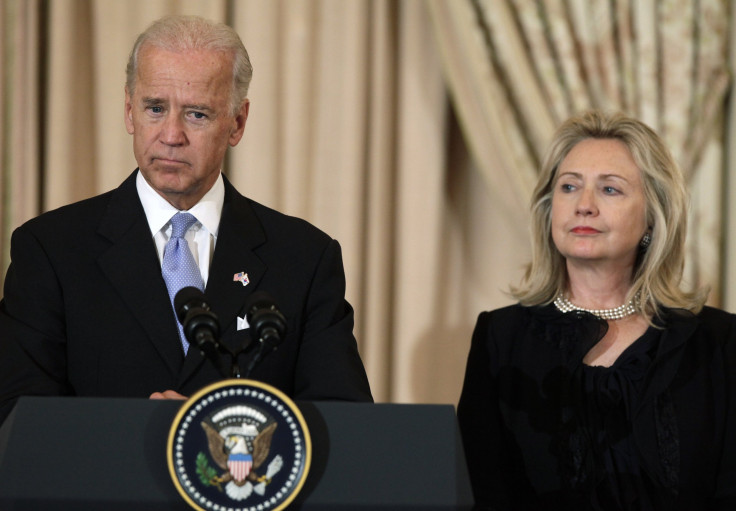Election 2016: Why Joe Biden Won't Be Campaigning For Hillary Clinton Anytime Soon

With Vice President Joe Biden’s announcement Wednesday that he will not run for president, Hillary Clinton retains her position as the Democratic front-runner and can breathe a sigh of relief. But while she won’t have to compete with Biden as she pursues the 2016 nomination, there is still a way for him to complicate her run: through his endorsement.
Clinton and Biden have a long history of working together over the course of their careers, and they profess a close relationship in public. But they have also butted heads at times, and in recent weeks as Biden decided whether he would run for president, he was seen criticizing her attitude toward Republicans. Now that he’s out of the race, it seems unlikely Biden will choose to endorse the former secretary of state for president during the primary race.
As recently as Tuesday night, Biden took a shot at Clinton during a dinner at the Georgetown Four Seasons honoring former Vice President Walter Mondale. “It is necessary to end this notion that the enemy is the other party, end this notion that it’s naive to think we can speak well of the other party and cooperate,” he said, according to Politico. During last week’s Democratic debate, Clinton said she was proud to have earned Republicans as her political enemies -- a line for which she received loud applause from the audience.
Biden also brought up not seeing Republicans as enemies during his Wednesday speech announcing he wouldn't run. Clinton tweeted a supportive message to the vice president after his decision.
.@VP is a good friend and a great man. Today and always, inspired by his optimism and commitment to change the world for the better. -H
— Hillary Clinton (@HillaryClinton) October 21, 2015The two have rarely been hostile in public. Rather, their disagreements typically come over competition and policy proposals. In 2008, when Biden and Clinton were running against Barack Obama for president, Biden criticized Clinton’s plan to cut off funding to Iraq’s military. He said that would be counterproductive, according to CBS News, and advocated for his own plan to decentralize Iraq.
"I think it would be a disaster if it is her plan," he told ABC's Diane Sawyer in an interview around that time.
Other signs have pointed to tension between the two Democratic leaders over the years. A former Obama adviser told Politico that despite their friendliness, Biden has mixed feelings toward the former secretary of state.
“He really likes her personally, but there’s been always an undercurrent of resentment,” the adviser said. “I think there’s always been an element of — and Biden is by no means the only one who has felt this — ‘Why does she feel entitled to [run] and I can’t?’ I imagine that’s playing a big part in his deliberations right now.”
Others have described their relationship as “not warm” and even as Clinton attended Biden’s son’s funeral in June, there were reports that her staff was irritated by the will-he-or-won’t-he nature of Biden’s 2016 decision process.
While Clinton worked as secretary of state and they both served in the Obama administration, there were reports that Biden was sometimes frustrated by Clinton’s hawkishness as he encouraged Obama to stay skeptical of the Pentagon. None of these clashes adds up to an outright feud or even a status as rivals, but there has been a sort of cold war at times underlying the moves of Biden and Clinton.
Now that Biden doesn't have to worry about his own 2016 prospects, perhaps some of that will subside. But as he made clear in his speech Wednesday, he also wants to use the last 15 months of his term as vice president to take action on issues important to him. His exit from the horse-race speculation could give him leeway to criticize the candidates as he has been doing with Clinton in recent days. Ultimately, that could mean trouble for Democrats in a general election with Clinton as the nominee, when Republicans could point to Biden's quips as evidence that she shouldn't be president.
© Copyright IBTimes 2025. All rights reserved.






















